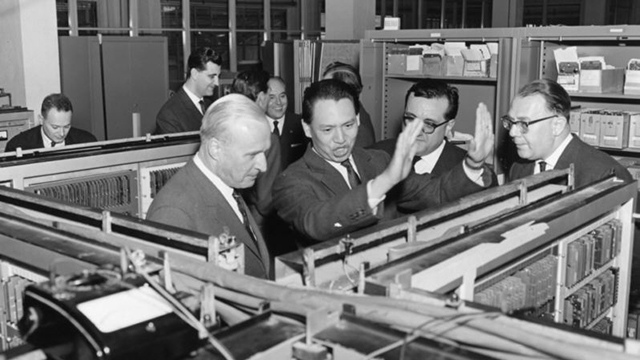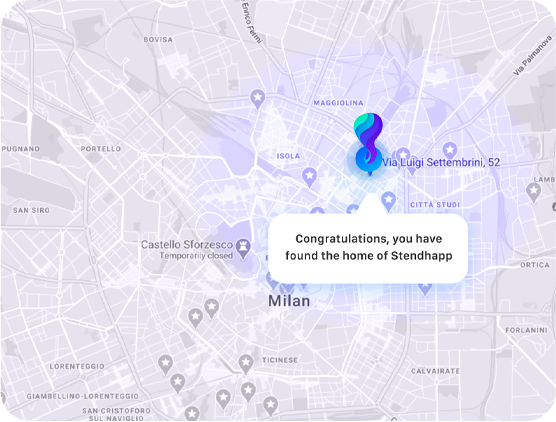Utopia according to Olivetti
“The term utopia is the most convenient way to dismiss what one has no desire, ability, or courage to do. I believe in dreams that become resolutions.” This sentence by Adriano Olivetti is the kernel of a science understood in a humanistic sense, as an integration between different disciplines that nurtures the formation of projective thinking. A texture, a weave, that the sixth edition of the ScienzaInScena Festival explodes and explores in its multifaceted and enlarged nature through a look that starts from outside us, beyond us, to reach stories of science that have left important traces in the recent industrial evolution of our country and beyond. Witnesses, propensities, visions, and daring admixtures defining the perfect theater to tell the story of a special man and a special machine, that of Mario Tchou and ELEA as a journey between chronicles, theories, and scientific aspirations that at first, when they were first conceived between Ivrea and the States, really seemed to border on science fiction.
Science fiction becomes reality
History, however, has shown how it was not science fiction, and at PACTA SALONE “ELEA the interrupted dream of Mario Tchou” put on the stage the invention of a man and the shattering of his dream, on the border between Icarus and Prometheus; a human, intellectual and scientific adventure that carved, in less than a decade, the path of Science and Knowledge, drawing a vision of the world desired with stubborn but lucid optimism, interrupted only because of a tragic (for some mysterious) car accident on November 9, 1961. In the car bound for Ivrea, Olivetti’s headquarters, was traveling that day the 37-year-old Mario Tchou, a visionary engineer who guarded the patent for a brand new calculator that would propel Italy to the forefront of the world in technological experimentation on artificial intelligence; a dream, indeed a purpose, that came to an end that night so much so that shortly afterwards Olivetti’s electronics division was divested and in 1964 was sold to the American General Electric.
Elea 9003 is the masterpiece of Olivetti led by Mario Tchou: an exceptional calculator, the ancestor of all future technology based on the binary system, named after the same name of the Greek polis where, more than 2,500 years ago, one of the most important philosophical schools for the development of Western civilization came to life: the Eleatic school of Parmenides. That of Elea is an elastic movement from philosophy to technology and back again, in a visionary and ingenious passage capable of combining the intuition of the Greeks with the concreteness of engineers. Elea, together a muse of thought and electronics designed at the turn of the ocean by the intersection of the minds of Adriano Olivetti, Enrico Fermi, Mario Tchou, and Ettore Sottsass…
The story of Tchou
The son of Chinese diplomats, born and raised in Rome, it was in fact in New York that Tchou met Olivetti in 1954, following a recommendation made to the Ivrea entrepreneur by Enrico Fermi, who had already been trying for some years to convince Olivetti to invest in electronics. Olivetti’s new Electronic Research Laboratory was opened a year later in Barbaricina, a suburb of Pisa; Giorgio Sandri, a technician who had arrived in Barbaricina in 1957, recalls in an interview the structure of the laboratory and the activities taking place there: “Going up to the second floor of the villa and looking out onto the balcony, you could see lawns and plants as far as the eye could see. Mario Tchou’s Office was furnished almost spartanly but with a rich library with volumes all strictly in English. In Barbaricina there was then the custom of meetings in which the front line participated, often expanded to include the main collaborators of each group.”
Teamwork, management by processes, models of communication and integration; ways of acting and thinking that were not lost with the subsequent move to Borgolombardo, in the province of Milan, where after a short time, in 1959, the team led by Tchou succeeded in bringing to fruition the Elea 9003, Italy’s first totally transistor-based computer. It was a cutting-edge product for the time, arriving a few months ahead of Ibm’s similar prototype, entrusted for the design to the genius of Ettore Sottsass, who had created a console with an ergonomic shape and with controls easily within the operator’s reach, in full compliance with Olivetti’s corporate philosophy: man and not a machine at the center of progress.
Elea’s development did not stop there: in 1960 the Elea 6001, a calculator of lesser cost and size oriented to scientific applications and thus aimed for medium users such as university institutes, public agencies, and medium industry, was produced; between 1960 and 1961, however, the passing first of Adriano Olivetti, who died suddenly on February 27, 1960, and then that of Mario Tchou, affected the company’s fortunes in the field of electronics.
A computer the size of a matchbox
Mario Tchou’s legacy in the field of technology, and also in the field of culture, embodies Italian excellence and moreover represents a testimony of integration between different cultures: a strong intellectual and human value, an alchemy between talent and determination that led to the achievement of fundamental scientific results, shines through his story. Tchou’s wife Elisa, interviewed on the occasion of the recent release of the fiction about Adriano Olivetti, recalls that her husband often talked about making a computer for the private market: “He showed me a matchbox, telling me that one day, the huge Elea would all be in there.”
A computer the size of a matchbox. A dream, indeed a purpose, that would propel the world much further. An acceleration that, perhaps, cost Mario Tchou his life.





